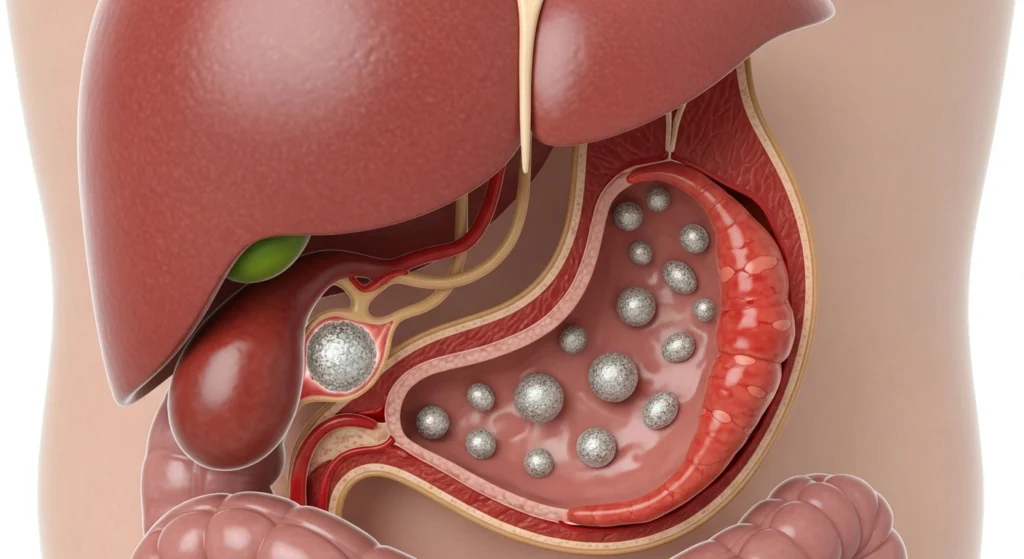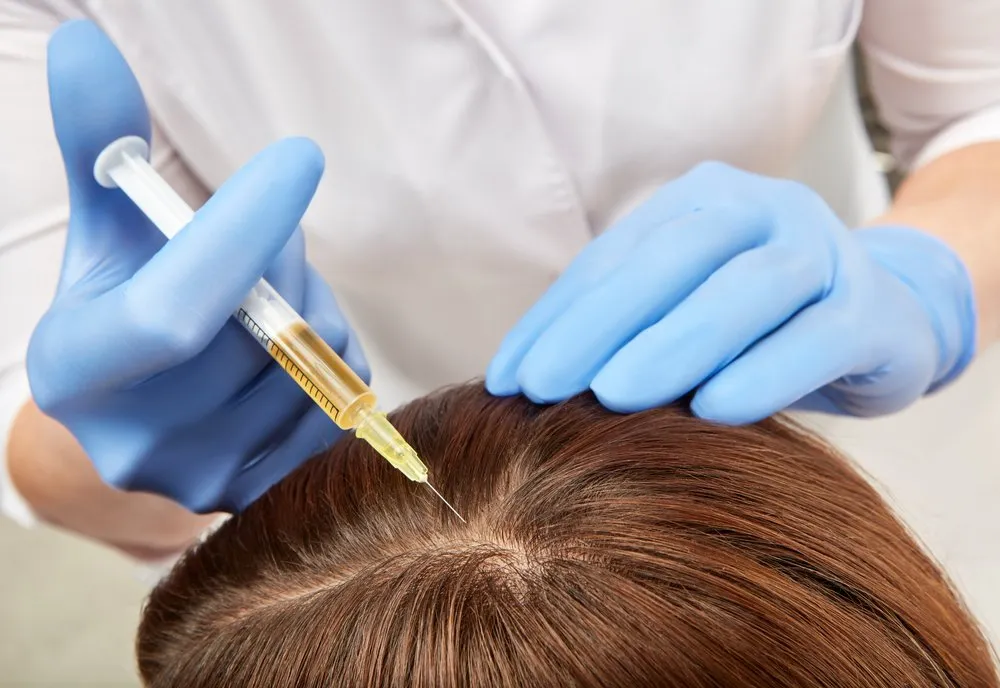Summary
Gallbladder issues can contribute to hair loss by causing nutrient deficiencies, hormonal imbalances, and stress. When the gallbladder isn’t functioning properly, the body struggles to absorb essential vitamins and minerals, affecting hair health.
Addressing gallbladder problems, improving diet, managing stress, and considering medical treatments can help restore both gallbladder function and hair growth. Consulting with a healthcare professional is key to finding the right solution.
Introduction
If you’ve been experiencing hair loss and are struggling to find a cause, it’s possible that your gallbladder health could be contributing to the problem. Can gallbladder issues cause hair loss? The answer is yes, gallbladder dysfunction can lead to nutrient deficiencies, hormonal imbalances, and stress, all of which play a significant role in hair loss.
In this article, we’ll explore how gallbladder issues may contribute to hair thinning and loss. You’ll gain insights into managing both your gallbladder and hair health effectively, with actionable tips and expert advice. By the end, you’ll have a clear understanding of how to prevent and manage this condition.
Understanding Gallbladder Issues

What Does the Gallbladder Do?
The gallbladder is a small organ located beneath your liver. Its main job is to store bile, which is produced by the liver to help digest fats. When you eat a meal high in fats, the gallbladder releases bile into the small intestine to assist with digestion. Without a properly functioning gallbladder, digestion can become difficult, affecting nutrient absorption throughout the body.
Common Gallbladder Problems
Several common gallbladder problems can impact your health, including:
- Gallstones: Solid particles that can block bile ducts, leading to pain and inflammation.
- Cholecystitis: Inflammation of the gallbladder, often caused by gallstones.
- Bile Duct Issues: Problems in the bile ducts that can disrupt bile flow.
Symptoms of these issues include nausea, indigestion, pain in the upper right abdomen, and, in some cases, jaundice (yellowing of the skin and eyes). If you experience any of these symptoms, it’s crucial to seek medical advice.
How Gallbladder Problems Affect the Body
A malfunctioning gallbladder can lead to digestive difficulties, which in turn may cause nutrient deficiencies. For instance, when bile production is compromised, the body may struggle to absorb fat-soluble vitamins (A, D, E, and K) and essential fatty acids, which are vital for overall health and hair growth.
Can Gallbladder Issues Lead to Hair Loss?
The Link Between Gallbladder and Hair Health
So, can gallbladder issues cause hair loss? The connection lies in how gallbladder problems can lead to nutrient deficiencies. Specifically, when the body cannot properly digest fats and absorb essential vitamins and minerals, it may impact the health of your hair follicles.
The hair growth cycle relies on several nutrients, including:
- Vitamin D: A deficiency is linked to hair thinning and loss.
- Zinc: An essential mineral for hair health, which is often deficient in individuals with gallbladder problems.
- Essential Fatty Acids: These healthy fats play a role in cell function, including the cells responsible for hair growth.
As a result, gallbladder issues can disrupt this nutrient absorption process, leading to thinning hair or increased hair shedding.
Nutrient Deficiencies Caused by Gallbladder Issues
When the gallbladder isn’t functioning optimally, several key nutrients become harder to absorb, such as:
- Vitamin A: Essential for the production of sebum, which nourishes hair follicles.
- Vitamin D: Plays a key role in the hair growth cycle. A deficiency can lead to hair loss, especially in the form of alopecia.
- Zinc: This mineral is crucial for hair growth. A lack of zinc can lead to slower hair regrowth and even hair loss.
As a result, if you have gallbladder issues and are not absorbing these nutrients properly, your hair may suffer.
The Role of Stress and Gallbladder Health in Hair Loss
Chronic stress often accompanies gallbladder issues, as the discomfort and health problems associated with the condition can take a toll on mental well-being. Stress is a known factor in many types of hair loss, including telogen effluvium, a condition where stress causes hair follicles to prematurely enter the shedding phase of the hair growth cycle.
Other Factors that Contribute to Hair Loss
While gallbladder issues can contribute to hair loss, several other factors can also play a role.
Hormonal Imbalance and Hair Loss
Hormonal imbalances, particularly issues with thyroid hormones or sex hormones like estrogen and testosterone, can also lead to hair loss. For instance, hypothyroidism can cause thinning hair, while polycystic ovary syndrome (PCOS) can lead to excessive hair shedding due to hormonal disruptions.
Poor Diet and Lifestyle Choices
A poor diet, lack of exercise, and insufficient sleep can all contribute to both gallbladder issues and hair loss. For example, a diet high in processed foods and low in healthy fats can strain the gallbladder, while also depriving your body of the nutrients it needs for healthy hair.
Medical Conditions Related to Hair Loss
Conditions like anemia, autoimmune diseases, and certain medications can also lead to hair loss. It’s important to consult a healthcare professional to rule out these potential causes if you’re experiencing hair shedding.
Hair Loss Myths and Misunderstandings
Many people believe that stress alone can cause immediate hair loss. However, hair loss due to stress typically occurs over a longer period, and other factors like nutrient deficiencies or hormonal imbalances often contribute to the condition.
How to Improve Gallbladder Health and Prevent Hair Loss
Improving your gallbladder health can go a long way in restoring both your digestive health and your hair growth. Here’s how:
Diet for Gallbladder and Hair Health
A healthy, balanced diet is crucial for both your gallbladder and hair. Focus on:
- Healthy fats: Avocados, olive oil, and fatty fish like salmon.
- Fiber-rich foods: Leafy greens, legumes, and whole grains to improve digestion.
- Lean proteins: Chicken, tofu, and beans to support overall health and hair growth.
- Supplements: Consider supplements like biotin, zinc, and omega-3 fatty acids if needed. Always consult with a healthcare provider before starting supplements.
Lifestyle Changes to Support Both Hair and Gallbladder Health
- Stress management: Practice yoga, meditation, or deep breathing exercises to lower stress.
- Hydration: Drink plenty of water throughout the day to support digestion and overall health.
- Exercise: Regular physical activity can improve gallbladder function and promote healthy circulation, which is vital for hair growth.
Medical Interventions
If dietary and lifestyle changes aren’t enough, medical treatments may be required. For gallbladder issues, treatments can range from medication to surgery (cholecystectomy). In terms of hair loss, treatments like minoxidil, hair transplants, or platelet-rich plasma (PRP) therapy might help. Speak with a specialist to determine the best course of action for both conditions.

FAQs
Can I regrow my hair after gallbladder surgery?
Yes, with proper treatment and nutritional support, hair regrowth is possible. Addressing any nutrient deficiencies and managing stress can significantly improve the chances of hair regrowth.
How can I tell if my hair loss is due to gallbladder issues or something else?
If you have gallbladder problems along with hair loss, it’s best to consult with a healthcare provider who can perform tests to determine whether nutrient deficiencies or hormonal imbalances are the cause.
Are there non-surgical treatments for gallbladder problems that can also help hair loss?
Yes, lifestyle changes and dietary modifications can improve both gallbladder function and hair health. Supplements and stress management techniques can also play a role.
Is hair loss caused by gallbladder issues permanent?
No, hair loss caused by gallbladder issues is usually reversible once the underlying condition is treated and nutrient levels are restored.
Conclusion
Understanding the connection between gallbladder issues and hair loss can help you take proactive steps to address both concerns. With the right combination of medical treatment, dietary changes, and stress management, it’s possible to improve both your gallbladder health and hair growth. If you’re experiencing these issues, consult a specialist to get a personalized treatment plan.
If you’re struggling with gallbladder issues or hair loss, don’t wait. Book a consultation with Dr. Rana Irfan in Islamabad today to receive expert advice and a tailored plan to improve your gallbladder health and restore your hair.
